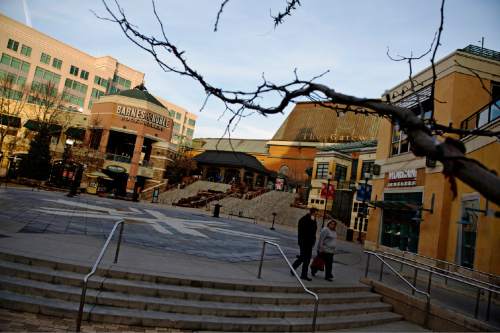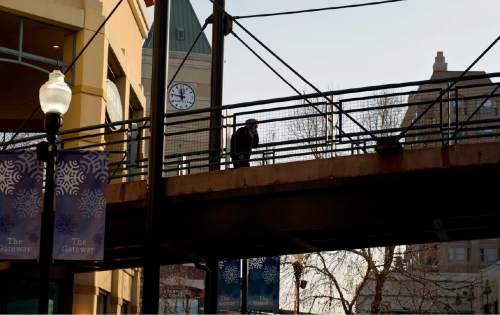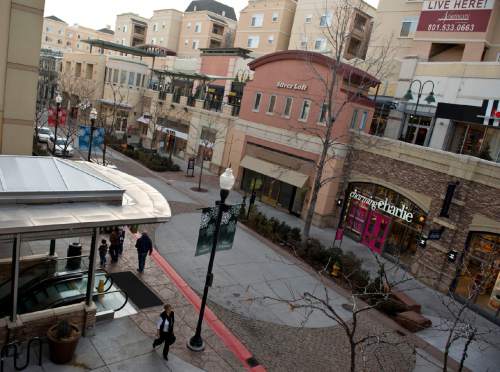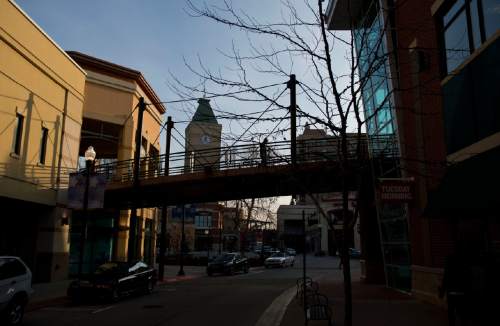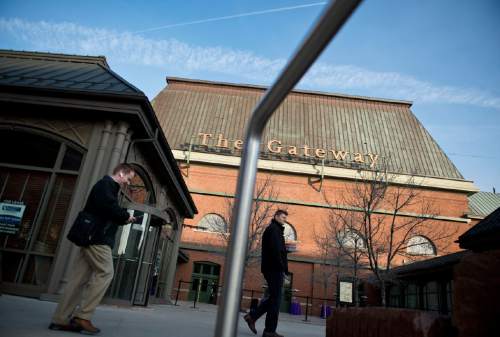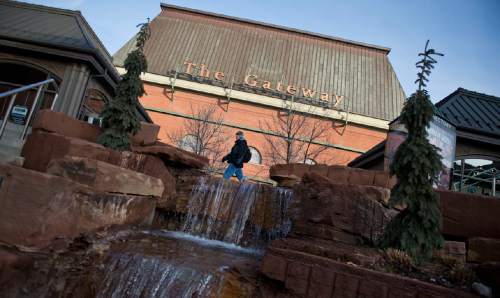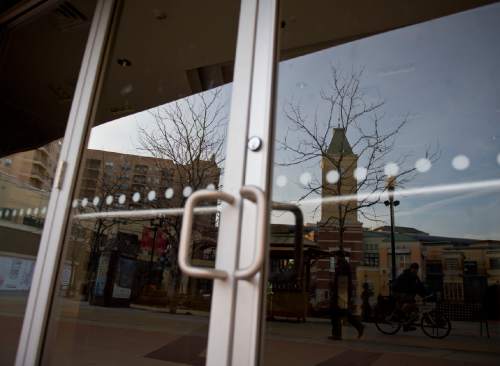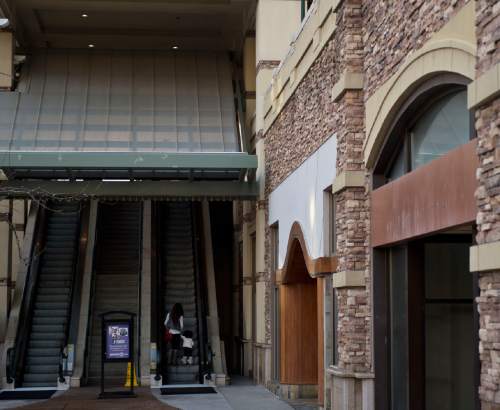This is an archived article that was published on sltrib.com in 2015, and information in the article may be outdated. It is provided only for personal research purposes and may not be reprinted.
The Gateway mall's financial problems are worsening in the face of competition from City Creek Center, according to a top U.S. rating agency.
New York-based Moody's Investors Service has flagged a $101 million loan to Gateway's owner that used the open-air Salt Lake City shopping center as collateral, warning bond investors that its faltering sales make that debt "a high default probability."
Concerns stem from the 623,973-square-foot mall's loss of major tenants — including the city's only Apple Store — to the newer, LDS Church-built City Creek Center a few blocks east on Main Street. That trend has dropped Gateway's occupancy rate to 78 percent as of September, down from 96 percent in 2010, the rating agency said.
Gateway's owner, Illinois-based Retail Properties of America Inc. (RPAI), slashed the mall's reported value in 2014 to $75 million, down from $163 million in 2010. The company, Moody's said, has warned its shareholders "that further decline in performance at the property was expected."
The agency now identifies Gateway as "troubled" in a December 2014 report, saying it "has factored into its analysis an elevated loss on the loan."
The Moody's report is the latest sign of problems at Gateway, where regular shoppers are well aware of empty storefronts and the departures of iconic retailers such as Apple, Anthropologie and Forever 21 for new digs at City Creek.
While speculation is widespread that Gateway might change hands or go under, its bosses are tight-lipped.
Utah-based Gateway managers referred inquiries on the Moody's report to officials at RPAI's Oak Brook, Ill., corporate headquarters.
RPAI spokeswoman Kimberly Freely declined to comment. But senior company officials have told investment analysts they hope to sell Gateway, one of 218 retail properties in RPAI's portfolio.
Sentiments are mixed among the struggling Salt Lake City mall's top remaining tenants and others with a stake in its health. Many remain upbeat about Gateway's future in light of new marketing plans, upgrades to some of its outdoor areas, several newly recruited stores and a host of residential and city-improvement projects planned in the vicinity in coming years.
"I'm optimistic,'' said Maria Farrington, CEO of Discovery Gateway Children's Museum, which drew more than 238,000 visitors last year. Plans by the mall's managers to reinvent Gateway as a regional entertainment center hold great promise, she said.
"We've very, very happy with that," Farrington said. "We want people to return."
Gateway's travails come as malls and stand-alone retailers across the nation face steep challenges from online commerce, which continues to soar. While not commenting directly about Gateway, one Salt Lake City real-estate expert said successful retailers will offer consumers robust Internet shopping as well as a satisfying in-store experience.
"Malls that are not providing that experience and look the same as you would see in the 1980s are having problems," said Darin Mellott, senior research analyst at CBRE. "But that doesn't mean that bricks-and-mortar retail is dead. Far from it."
Gateway opened in 2001 as a beige blend of stores, restaurants, movie theaters, condominiums and office space on the western edge of downtown, surrounding Union Pacific Depot along 400 West between 200 South and South Temple.
Built by The Boyer Co., the $375 million project drew on private and taxpayer funds in hopes of bringing urban renewal to a blighted area once devoted to warehousing, rail shipping and heavy industry.
Boyer sold Gateway's retail properties in 2005 to RPAI, a publicly trade real-estate investment trust formerly known as Inland Western. The Salt Lake Tribune relocated from Main Street to a Gateway office building that same year. Private real-estate investors bought four of Gateway's office buildings in 2013.
Today, Gateway boasts 89 outlets, anchored by a 12-screen Larry H. Miller Megaplex Theatre, Dick's Sporting Goods and bookseller Barnes & Noble. New arrivals include DOPO, an Italian restaurant offering live music, and Mystery Escape Rooms, a sleuthing-themed entertainment center. The national gaming arcade chain GameWorks opened a 26,000-square-foot entertainment, sports and dining complex at the mall's north end in November.
The Church of Jesus Christ of Latter-day Saints launched its $1.5 billion City Creek Center in March 2012. New figures showcase the dramatic slump in Gateway sales since then.
Numbers disclosed to the Utah Tax Commission show Gateway's annual taxable sales fell from $210 million in 2011 to $100 million two years later.
City Creek shot up from zero to $250 million in taxable sales during that same period.
Taxable sales totaled $190 million at City Creek in the first 10 months of 2014, compared with $70 million for Gateway. (Those numbers exclude Christmas holiday sales in November and December.)
RPAI's chief financial officer, Angela Aman, told market analysts last October the company was trying to stabilize and sell Gateway, but that contracts with two separate buyers had fallen through due to the deteriorating earnings.
"We will continue to work toward the successful repositioning and remerchandising of The Gateway," Aman told analysts. RPAI will also "explore strategic alternatives."
The mall's woes led Moody's to downgrade its rating on several mortgage-backed securities issued by JPMorgan Chase, largely because those securities included the Gateway-secured loan to RPAI. The commercial-mortgage bonds had bundled the Gateway loan with debts secured by 95 other retail properties across the country and sold them to investors in 2010.
The Gateway loan represents about a fifth of the total value of the JPMorgan bond offering, according to Moody's. The agency's action affected a total of about $469 million in securities.
A Moody's spokesman said JPMorgan's bond package was the first of its kind sold to investors since the 2007-2008 global financial crisis to have its rating lowered.
Twitter: @Tony_Semerad


